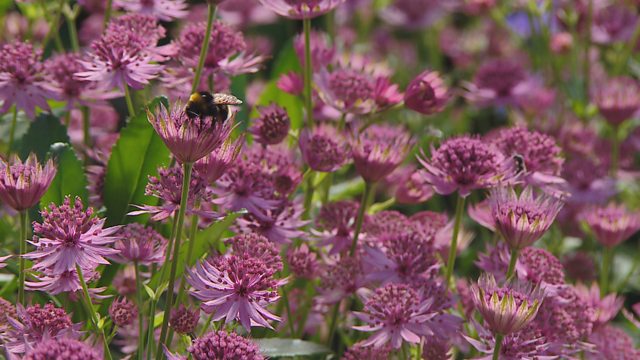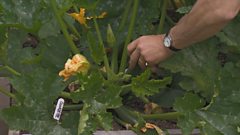
Episode 16
Gardening magazine. Monty Don welcomes us to his garden at Longmeadow and Carol Klein discovers more about the wildlife that depend on the habitat that garden ponds provide.
Monty Don welcomes us to his garden at Longmeadow and offers some timely tips on keeping gardens at their best right through to the end of the season.
Carol Klein meets wildlife enthusiast Steve Head to discover more about the wildlife that depend on the habitat our garden ponds provide.
And Joe Swift gets an exclusive behind the scenes tour of the private gardens at Eton College, that counts prime minister David Cameron amongst its long list of VIP ex-pupils.
Last on
Clips
-
![]()
Monty’s summer harvest
Duration: 03:20
-
![]()
Wildlife ponds
Duration: 05:51
Potatoes

Potato tubers are ready when the plant finishes flowering; if you’re unsure gently excavate around the plants and look for potatoes. When harvesting, dig up the whole plant and make sure you remove all potatoes because any left behind will grow next year and act as a weed. It is important to prevent this as they can also harbour diseases such as blight which can infect future crops.
Monty has grown the potato variety ‘Charlotte’, a second early; he likes these waxy spuds simply boiled and topped with butter or oil and some salt and pepper.
(www.rhs.org.uk)
Courgettes

Courgettes are great harvested young when the fruit is sweet. By picking regularly you get a large number of smaller courgettes rather than a few larger ones.
Three to four courgette plants should feed a family for the summer. You’ve still got time to sow direct or buy young plants to grow. Crops are usually ready in 60 days after sowing, giving you fruit at the end of August or in September.
(www.rhs.org.uk)
Rocket flowers and sweetcorn

Rocket can be grown for both foliage and later on, edible flowers. The flowers are spicy and sweet and make a wonderful addition to salads so they are well worth a try.
When Monty clears his old rocket plants he adds a thin layer of homemade compost to add fertility to the soil before planting out the next crop: sweetcorn. It is essential to plant this wind-pollinated crop in a grid to take advantage of the breeze blowing in any direction. Sweetcorn can be under-planted with ‘catch crops’ such as salads, radish, courgettes or French beans.
(www.rhs.org.uk)
Garden featured

Eton College
Windsor
Berkshire
SL4 6DW
Joe Swift gets an exclusive look behind the garden gates of Eton College and enjoys a tour of the 500 year old institution with head gardener Michael Long. Eton not only produces politicians and princes but also great gardeners including designer and RHS Council Member, James Alexander-Sinclair.
If you’d like to visit the gardens at Eton College look out for its June open day in 2015, details of which will be on the NGS website in the future.
(www.ngs.org.uk)
Wildflower Meadows

It’s important to remove weeds from meadows before they drop their seed. Plants like dock and sow thistle have many hundreds of seeds per flower which have the potential to dominate an area.
By removing weeds and making more space for the plants you want to keep, such as ox-eye daisy, vipers bugloss and red clover, you can create a rich mix for wildlife and also for your enjoyment.
Each garden situation and meadow is different; by following the link below you’ll find a leaflet (PDF) with advice and information on how to create a meadow that suits you.
(publications.naturalengland.org.uk)
Jobs for the weekend: Cut back chives
Rejuvenate chives which have finished flowering by cutting them right back and giving them a good soak of water. Within a few days you’ll have a fresh flush of leaves for use in the kitchen.
(www.rhs.org.uk)
Jobs for the weekend: Support autumn-fruiting raspberries
Autumn-fruiting raspberries are cut back to the ground every winter. As fresh new stems begin to mature and set fruit in summer the tops become heavy, which can cause them to splay.
Put stakes in the ground at regular intervals around the plants and wrap twine around them. This will contain the raspberries and prevent them from flopping over whilst also making it easier to harvest fruit.
(rhs.org.uk)
Jobs for the weekend: Tie-in clematis
Keep on top of clematis growth by tying in regularly during summer. As the plants continue to climb and flower they can create large mounds of growth which are easily damaged in summer storms and can even pull the whole plant down from supports.
(www.rhs.org.uk)
Credits
| Role | Contributor |
|---|---|
| Presenter | Monty Don |
| Presenter | Carol Klein |
| Presenter | Joe Swift |
| Series Producer | Christina Nutter |
| Series Editor | Liz Rumbold |
Broadcasts
- Fri 4 Jul 2014 21:00
- Sun 6 Jul 2014 07:40
- Thu 10 Jul 2014 10:05


